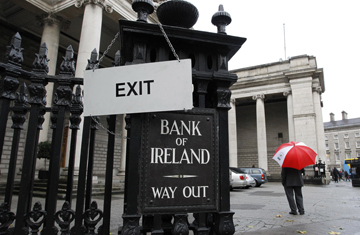
The Bank of Ireland headquarters in Dublin, Ireland, Thursday, Nov. 4 2010
It has been described as Irish Prime Minister Brian Cowen's "tax and grab," the most draconian budget in the history of the state — and one that has sparked another round of public anger toward an already beleaguered government. On Thursday, Finance Minister Brian Lenihan announced that when the 2011 budget is unveiled on Dec. 7, it will include austerity measures totaling an eye-watering €6 billion ($8 billion). That's double the original amount of €3 billion ($4 billion) that was announced in last year's budget, itself considered a savage hit at the time.
The measures — based on a 3:1 ratio with €3 in cuts for every €1 in tax increases — represent the first stage in the government's €15 billion ($20 billion), four-year budget plan. The cuts should bring Ireland's deficit down to between 9.25% and 9.5% of GDP. Currently at 32%, the country's debt has sparked fears of a Greek-style bailout.
Still, the steepness of the cuts have come as a surprise to many, since as recently as September the government was still invoking the original €3 billion sum. After Thursday's announcement, Cowen attempted to sweeten the pill by pointing out that the government's budgetary strategy is on course. He also suggested that the Irish people could find the cuts more manageable if they focus on the fact that this first round of cuts already takes them half-way through the adjustment.
But that's little consolation to a population already punch drunk from a seemingly endless series of economic hits, where each day seems to bring more bad news on the country's finances. There's no doubt that the new austerity measures will spread a lot of pain. The widening of tax bands, for example, means that approximately 30,000 low-income workers will now be paying tax for the first time. Almost everyone in Irish society will be affected, with a €1 billion cut to health-service funding and a €1,000 ($1,400) rise in college registration fees expected. Reductions in pensions and social-welfare payments, cuts in child benefit and the introduction of a property tax are also in the cards.
The big question now is whether Ireland's coalition government — made up of Fianna Fail and the Green Party — is able to get this enormous budget adjustment through the Dail, the lower house of parliament. It doesn't help that the government's authority has been undermined by a High Court ruling on Wednesday that said it had "unreasonably delayed" holding a by-election in the Fianna Fail constituency of Donegal South-West. The seat has been vacant since June 2009. Following a legal challenge by opposition Sinn Fein senator — and Donegal South-West candidate — Pearse Doherty, the court ruled that the delay was "unprecedented" and amounted to a breach of Doherty's constitutional rights. The by-election has now been scheduled for Nov. 25.
Political broadcaster Brendan O'Brien says that, with two other by-elections also due, the consequences of the High Court ruling could be serious. "If Fianna Fail gets a real drubbing [in the by-elections], given the Dail arithmetic and the hurt from the Budget, pressure will mount for a general election or a heave against Cowen," he says.
Stephen Collins, the Irish Times political editor, says that the critical issue in achieving public acceptance for the harsh budgetary measures is that "the adjustment is seen to be fair and that privileged groups who have escaped up to now are seen to suffer like everybody else." And he thinks the opposition's demands for a general election are just a smoke-screen to divert attention from the fact that what they really want is for the coalition to stay in power just a little while longer. "The private hope of many opposition [MPs] is that Fianna Fail and the Greens will get the budget through the Dail, and then face the odium of the electorate for doing so," he says. Opposition leaders would have no choice but to impose an equally tough budget if they achieved power before Christmas, says Collins, so they would much rather fight an election after the budget than before it.
Yet even faced with crushing cuts and a government under severe strain, Ireland on Friday got a reminder that things aren't all that bad. A U.N. Development Programme put the country in the world's top five in a quality-of-life index, based on factors such as life expectancy at birth and gross national income per capita. Only Norway, Australia, New Zealand and the U.S. rank higher. Ireland may be enduring some dark and difficult economic times, but it seems all is not lost.
